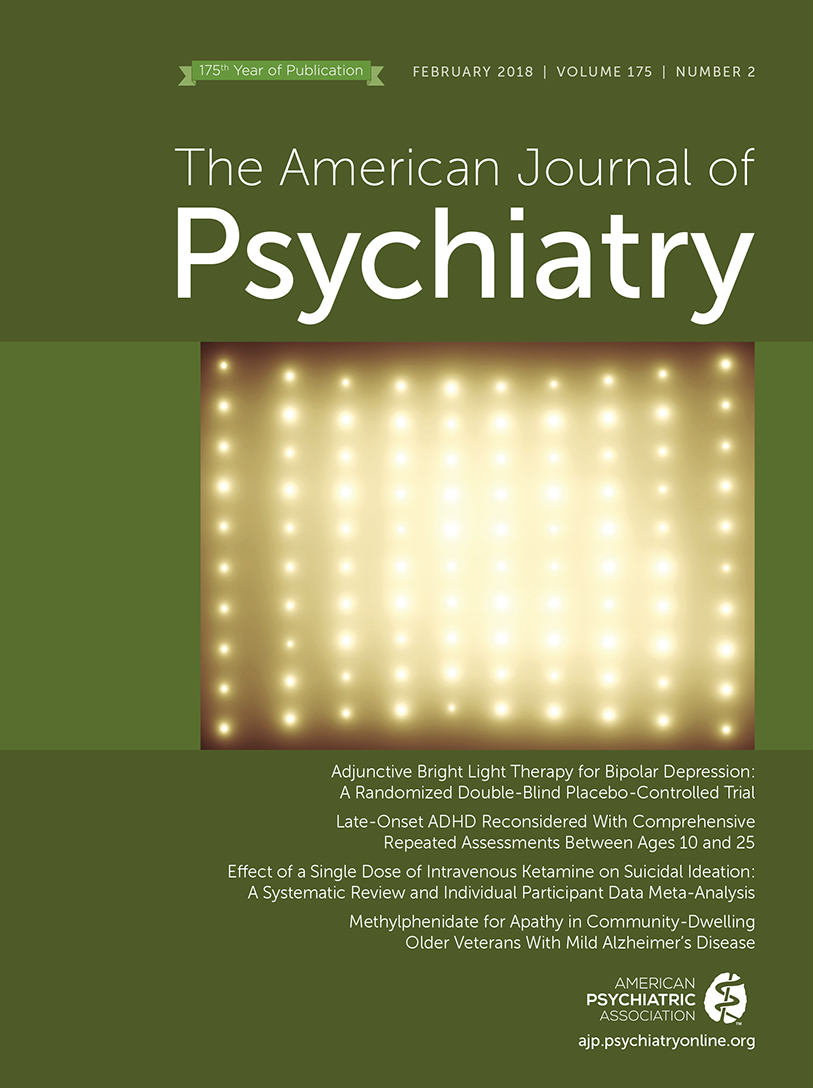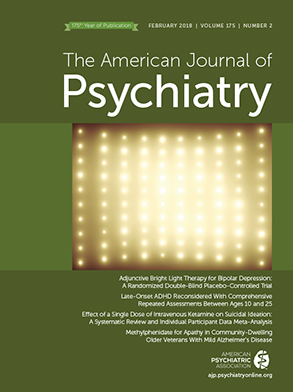Delusions, anxiety, apathy, agitated or aggressive behavior, and other neuropsychiatric symptoms are core clinical features of Alzheimer’s disease. Among these symptoms, apathy is probably the most common and often occurs early in the course of cognitive decline. Apathy may represent a particularly toxic aspect of the neurodegenerative process—it predicts future cognitive decline in healthy older adults and those with mild cognitive impairment (
1).
Apathy in Alzheimer’s disease may seem a benign symptom compared with aggressive behavior or delusional thoughts. However, research findings and clinical experience indicate otherwise; apathy contributes prominently to functional disability, caregiver distress, institutionalization, and increased mortality (
2,
3). The Patient Perspective that accompanies the article by Padala et al. in this issue of the
Journal cites a caregiver’s view: “What I was not prepared for was his not wanting to do anything” (
4). Caregivers often note prominent disinterest and detachment as the memory decline of Alzheimer’s disease emerges, and the consequential “emotional widowhood” they experience complicates their ability to cope and assist with their loved one’s memory decline.
Optimal medication or behavioral interventions to improve apathy, like other neuropsychiatric symptoms in Alzheimer’s disease, have been elusive. Neurobiological mechanisms thought to play a role in motivation, reward seeking, and goal-directed behavior suggest that pro-dopaminergic approaches may improve apathy, and some small clinical trials have been supportive. In their study, Padala and colleagues have expanded the evidence base in a trial of longer duration than previous efforts. Their results from a study of 60 men randomized to masked treatment with either methylphenidate or placebo for 12 weeks reveal improvement in the methylphenidate group that is likely clinically meaningful. Benefit was noted on the primary apathy outcome measure, along with secondary measures of global clinical impression, functional skills, depression, cognition, and caregiver distress.
There are several notable features of the study and its findings. First, clinical benefit of methylphenidate treatment was apparent at week 4, and the benefit over placebo increased at weeks 8 and 12 on the primary apathy outcome. Secondary measures of functional skills, caregiver burden, depressive symptoms, and cognition did not generally show benefit from methylphenidate until week 12. The reasons for increasing or delayed responses are not clear and probably are unrelated to study dropouts, which were few, or pharmacokinetic drug accumulation. Delayed or evolving pharmacodynamic neuroreceptor system changes related to dopamine agonism may be responsible. There also may be a positive social feedback loop of initial increased interest and engagement that expands over time with enhanced behavioral and emotional responses from the caregiver and others, resulting in progressive apathy improvement. The methylphenidate group also showed mild global cognitive improvement on the Mini-Mental State Examination to an extent greater than that usually seen in cholinesterase inhibitor trials for mild to moderate Alzheimer’s disease. Improved attention, concentration, or test-taking motivation related to enhanced dopaminergic tone may be involved.
Second, the study highlights important distinctions between apathy and depression. Reduced interest and motivation can occur in both conditions, although the apathy syndrome lacks the sadness, hopelessness, and helplessness of depression. In fact, while major depressive episode was exclusionary in this methylphenidate trial, mild depressive symptoms were common, and more than half of participants were taking antidepressant medications. Depressive symptoms were improved at treatment week 12. However, the analysis indicates that the treatment effect on apathy over time was not largely related to depressive symptoms, supporting at least modest independence in treatment response. Previous studies of clinical phenomenology, longitudinal course, and neurobiological underpinnings of both apathy and depression in Alzheimer’s disease further support this distinction, with important implications for diagnosis and clinical management.
Finally, adverse effects observed in the study deserve mention. There were no between-group statistical differences in any individual or category of adverse effects, and there were few dosage reductions or episodes of insomnia in the methylphenidate group, supporting the safety of the dosages prescribed in this population. Prior studies of methylphenidate for other conditions in older adults have similarly shown few adverse effects at this dosage. However, the sample size in this study was small, limiting the power to detect group differences or important but uncommon side effects, and the hospitalizations and single seizure episode in the methylphenidate group are notable. Moreover, systolic blood pressure increased by an average of 18 mmHg in the methylphenidate group, despite the study’s exclusion of those with uncontrolled hypertension. Such an increase in blood pressure is clinically important for many older adults, and this finding suggests that monitoring is essential.
So, why do these findings or the construct of apathy in Alzheimer’s disease matter, either heuristically or clinically?
From a clinical perspective, apathy and other neuropsychiatric symptoms represent much of the morbidity of Alzheimer’s disease and add to caregiver burden and health care costs. Improved approaches to recognizing, measuring, tracking, and treating these symptoms can benefit patients and caregivers and optimize health care. Importantly, the magnitude of apathy improvement seen in this study is clinically meaningful for many people with Alzheimer’s disease and their caregivers. Because the study includes a modestly sized sample of community-dwelling men with mild Alzheimer’s disease only, further study in broader or comparison populations can confirm benefit and help clinicians identify individuals likely to benefit from a methylphenidate trial. It would also be useful to know whether longer-term methylphenidate treatment can modify disease expression and affect the cognitive or behavioral trajectory of Alzheimer’s disease or mild cognitive impairment.
Conceptually, the common early presence and characteristic nature of apathy in Alzheimer’s disease are reminders that neuropsychiatric symptoms are specific expressions of the neurodegenerative disorder. Research findings demonstrate a role for genetic variance, regional neuropathology, focal brain atrophy, regional cortical dysfunction, and altered neuroreceptor binding as contributors to psychiatric symptoms in Alzheimer’s disease (
5–
9). Individual domains of apathy—cognitive, behavioral, and emotional—may be related to dysfunction in distinct brain structures relevant to different aspects of directed attention, motivation, and emotional interest (
10). Such a conceptual framework can broaden understanding of the Alzheimer’s disease phenotype. This framework also promotes opportunities to refine links between clinical symptoms and underlying neuropathology, such as regional β-amyloid accumulation, neurofibrillary tangles, neuroreceptor alterations, and neurodegeneration. It can reveal critical targets for treatment or prevention of cognitive and psychiatric symptoms across the Alzheimer’s disease clinical continuum and can also identify mechanisms that promote resilience and brain health.
Finally, the neuropsychiatric symptoms of Alzheimer’s disease suggest an important role for psychiatrists and allied mental health providers in Alzheimer’s disease clinical management. Historically, apathy, mood symptoms, delusions, and agitated behavior in Alzheimer’s disease have not been ideally considered in many health care settings. Clinical assessment and management can be challenging, and follow-up care is key. Behavioral health care providers can bring a skill set and collaborative approach to optimize clinical outcomes and improve life quality for patients with Alzheimer’s disease and their caregivers.

